#first henriad
Explore tagged Tumblr posts
Text
I'm so normal about Shakespeare women who take on traditionally male roles in the narrative. I'm so normal about Helena chasing what she wants with that rabid want that's usually given to men. Helena pushing and pulling the story so she gets what she wants, while Bertram is pushed and pulled into what she wanted. Helena wanting so much it tears the story apart but puts it back together at the end (or does it?)
I'm so normal about Margaret's expanded and ahistorical journey, the way she's given her own ending because Shakespeare gives her the narrative respect usually reserved for men. The way she moves alongside Richard 3, the second overarching character of the first Henriad. Weak Henry and Strong Margaret. And Margaret, cursing the world as the last remnant of Richard's past.
And Beatrice? My God, Beatrice! Beatrice, who makes Benedick listen. Beatrice, who, despite everything she's allowed, every bit of wittiness and transgressive behavior, still can't take on the role of a man when she needs it. She can't push past what the men in her life, what Shakespeare, writing it, will allow her. In the end, I'm so normal about seeing where the limit is, where the women written by a man have to stop. What's the line they can't cross? Where do they stop being part of the narrative and become women again? Just women. Do the women get to be heroes? Villains? Real, breathing people with thoughts and feelings?
#helena#margaret of anjou#beatrice#shakespeare#all's well that ends well#henry vi#first henriad#much ado about nothing#chewing on wires. thinking too hard#barely coherent btw. I'm not even sure what I'm trying to say but I know I can't stop thinking about it#margaret my fucking girl#women in shakespeare
23 notes
·
View notes
Text
#polls#shakespeare#rose tetra#henriad#big sorry to the girlies that missed the poll like richard ii's duchess of gloucester and henry iv's doll tearsheet#and alice and queen isabelle/isabeau from henry v and eleanor duchess of gloucester in henry vi pt 2#only 10 options allowed and the first tet ladies are too iconic to cut down on#also i don't know king john i just know my one mutual loves constance#one day i will read it
16 notes
·
View notes
Text
i think reading the first three shakespeare henriad plays back-to-back-to-back has broken my brain for the last three months
#and i read shakespeare's book: the making of the first folio (2023) by chris laoutaris in between r2 and 1h4....#april may and june have been highly shakespearean months for me#i haven't read as much shakespeare in recent years as i had been when i first received the riverside shakespeare so i was feeling#some kind of way. wanted to make up for it.#i always tried to read at least one play a year#but now i have a problem. i've read 20 plays and 7 of the plays i have read are english histories#which is too high of a number for my liking. THE HISTORIES HAVE BROKEN MY BRAIN!!!!!!#tales from diana#i have only read five (5!!) of the proper comedies#7 comedies if you count romances as comedies#oh god. i need to do smth about that number#perhaps i should read a comedy before i go onto henry the fifth even though i reallyam looking forward to it....#that's like everyone's favorite play in the henriad seemingly#idk this series as been really good so far#i think richard ii might still be my favorite but henry iv part 1 had some really great moments too#henry iv part 2 was a bit slow in the beginning but it had a great ending#i also realized i haven't read a proper tragedy since 2020 lol. w king lear#i honestly barely remember king lear... i should watch a production of it soon#idk i read king lear in the beginning of the pandemic so that's fogged up w WEIRD memories and. idk#i should probably reread it someday but right now there's just so much else i want to get to read first#king lear wasn't my favorite when i was reading it but that might've just been. hard to get into bc of the state of the world#i did in fact read it bc shakespeare wrote it during the plague but. that was not of comfort. to say the least#i told myself i'd take at least a month after finishing henry iv part 2 to read other things that ive been slacking on#particularly other plays. i have a lot of drama i want to read that is NOT shakespeare. i do. i do have other playwrights i like#gonna start by reading some plays from my norton anthology of drama and just. kick back
2 notes
·
View notes
Text
We just dropped the first song on our new musical's album and I'm SCREAMING!!!
And it has a TITLE!!
Meet "Brave Sons of England" an Epic New Musical based on Shakespeare's Henriad!
instagram
@socialshakespeare and all the Henriad readings during the pandemic heard me carrying on about it back when we were starting it and NOW ITS HERE! (I promised I'd tag you guys back in 2020....so here ya are!!)
#musical theatre#musicals#new musical#shakespeare#henry v#henry iv#richard ii#the Henriad#brave sons of England the musical#Instagram
55 notes
·
View notes
Photo

Voltaire
Voltaire (1694-1778) was a French author, historian, and philosopher whose thoughts on religious toleration and moderation of authoritarian power were influential during the Enlightenment. His most famous work today is the satirical Candide, which presents Voltaire's critical thoughts on other philosophers, the Catholic Church, and the French state in order to highlight the need for real solutions to everyday problems.
Early Life
François-Marie Arouet, better known by his chosen pseudonym Voltaire, was born in Paris on 21 November 1694. Françoise-Marie's father was a notary who sent him to the highly esteemed Louis-le-Grand college, then run by Jesuits. Going on to study law, Françoise-Marie's real interest was literature, and he was soon writing his own poems and plays. These early offerings were the beginning of what would turn out to be a momentous catalogue of works of all kinds by the end of Voltaire's long career.
In 1718, Voltaire's first play, Oedipus, was successfully staged, and he had his first poem, La Henriade, published to great acclaim in 1723. Voltaire might have had literary aspirations, but his fledgling career took a nosedive in 1726 when, after an argument with the Chevalier de Rohan, he was confined in the infamous Bastille prison. When he got out, Voltaire decided to broaden his horizons, and he visited first the Netherlands and then England, where he lived until 1729.
Continue reading...
33 notes
·
View notes
Text
the case for hyper-femme hotspur
this is my tumblr blog and this is like kind of just what we do heresies
OK so basically okay so
first of all i think anytime there is a character who is so strongly associated with an extreme form of gender expression in our collective zeitgeist (i.e hotspur and hyper-masculinity) there’s something not only extremely fun to play with but incredibly valuable about analyzing the story from the opposite end of the gender performance specturm. also canonically there are like 3 female characters in 1h4 and that sucks. also also don’t you want to see hotspur in pink glitter? i know i do and this tumblr is not a democracy!!
in this hypothetical dream sparkly version of the play, both hotspur and worcester would be women. not played by women, i mean textually explicitly women. this is important!!
worcester should be very nancy pelosi hillary clinton-esque in the way that this is a middle-aged woman who has been taught that to be successful in her field (politics) she will have to strip herself of most of her femininity and perform a certain level of masculinity in order to be taken seriously. this creates a whole other layer to the hotspur/worcester dynamic when all of a sudden this young, hyper-feminine woman is being taken more seriously and being given more praise than someone who has worked and fought through the bullshit and done it all “right”. she hasn’t earned her place, she hasn’t had to struggle - and worcester resents her for that. (there’s like a whole dissertation to be written about how much of 1h4 changes when only worcester is genderbent, i love you queen worcester you are everything not in this version here you kind of suck lowkey)
henry iv is just a misogynist he just kinda sucks but like this is something we all knew screw that guy
ok now we can talk about hal because i know hes like the one all you little gay people care about.
to me, it’s never made sense why the Henriad is framed as hal’s hero’s journey. maybe it’s because i’m queer (i’m like actually positive that’s why), but leaving home and finding acceptance and family from a group of outsiders who society has deemed as worthless is the path i’ve watched so many friends walk. having to leave that and return to your shitty dad because “duty calls!” and THEN leaving behind and disavowing the same community that opened its arms to you? i don’t see that as an awesome coming-of-age about learning how to handle responsibility, that’s deeply, deeply tragic. and far farrrrr too true a reality for most members of our LGBTQ+ community here (Bible Belt). SO guess where this version of 1h4 is set!!!!!! anyways, its the Medieval Revival of the ‘70s in the Bible Belt south, the Boar’s Head is a gay bar, and hal is trans.
hal is trans-masc in some way and this needs to be incredibly explicit (like pronouns pin with trans flag on costume explicit). and then when the news breaks, when “I’ll to the court in the morning.” (we’re cutting the text so this is where that scene ends. cool? cool. cool!), hal takes the pin off. it needs to be like A Moment. it should make me cry, and i cry really easily so that’ll probably be pretty easy to do, but this is a gut punch.
oh and lady percy is still a woman, they’re gay, because i said so. blah blah blah because look hotspur and hal really were so alike all along and look hotspur is fighting so voraciously because she’s hungry for a world where she can openly and unabashedly be with the person she loves but ultimately because i love lady percy and i love lesbians and this play doesn’t need another man. but also because look hotspur is fighting so voraciously because she’s hungry for a world where she can openly and unabashedly be with the person she loves. worcester and vernon should also both be women and have the blossoming of a relationship but be a lot more discreet about it (worcester should be extremely hesitant). now we get a cool split between younger and older generations of activists in both the feminist and the gay rights movement oooo themes oooo motifs oooo lady gagita
as far as hal/hotspur parallels go, it’s probably pretty obvious at this point. your dad constantly praising someone who represents, at least in his mind, the ideal concept of a woman, disappointed you can’t be more like her, all the while you’re coming to terms with the fact that you’re not a woman, but he’ll never see that, so what the fuck are you supposed to do?!? it’s a LOT! but i think there’s also something to be said about the less obvious parallel. which is that hyper-femininity is NOT an attempt at ideal polite womanhood or self-Stepfordization, hyper-femininity is in fact the extreme performance of womanhood in rejection of that. hyper-femininity is queer in nature (also hotspur quite literally has a wife but i guess hal wouldn’t be able to tell that just by looking at her) there’s something to be said about the moment hal and hotspur see each other, and then the moment hal and hotspur seeeeeee each other. and go hey, you’re just like me. this person who you’ve been constantly compared to and made out to be lesser than because you dare to be deeply wildly madly truly you is in fact exactly the same. we’re the same. and oh my god, in another world wouldn’t it have been lovely to just like go dancing together? sucks it’s not another world now we’re going to gay fight each other i guess
#also thinking about the line “Thou speak'st as if I would deny my name” in this context#my dream version of 1h4 has a lot of cuts/mix and match line reassigments#but that felt like A LOT to get in to#and frankly after a six show week with two PR engagements a girl is TIRED!!!#i hope you liked this i hope it made sense!! im going to go do my hair for the second of those aforementioned PR engagements now by interne#1h4#henriad#shakespeare#henry iv 1#shameless self plug if you like this you should read my play mwahahhaahahaha!!!!#ambomsaqbime#a merry band of misfits save a queer bar in medieval england#henry iv part 1
20 notes
·
View notes
Text
Henry Henry is a reworking of the Henriad, the set of Shakespearean history plays dealing with the fates and fortunes of the final Plantagenet King Richard II and the first Lancastrians Henry IV and Henry V. They are plays about family dysfunction and the relationship between the self and authority, between society and the individual, duty and care, responsibility and vice. Bratton fondly describes them as “the daddy issue plays.”
...Bratton also has this great read on Hal as a gay disaster: “It’s funny because Shakespeare’s Prince Hal is, I think, one of the progenitors of the modern Gay Disaster,” he said. “He drinks too much; he plays stupid, mean pranks; he’s torn between his daddy and his disappointed father. But Shakespeare’s Hal is generally seen as a lovable scamp whose redemption is inevitable. I found myself trying to play with the sympathies of my imaginary audience, taking Hal back and forth very rapidly between the roles of victim and perpetrator. It mirrors the way Hal uses the people around him to play with his own sense of self—he has this little dance he does that’s like, ‘Do you hate me now? How about now? How about now? Ahh, but don’t you love me really.’”
#shakespeare#william shakespeare#brandon taylor#new book#books#shakespeare in literature#shakespeare and adaptation#henry iv#henry v#prince hal#hotspur
115 notes
·
View notes
Text



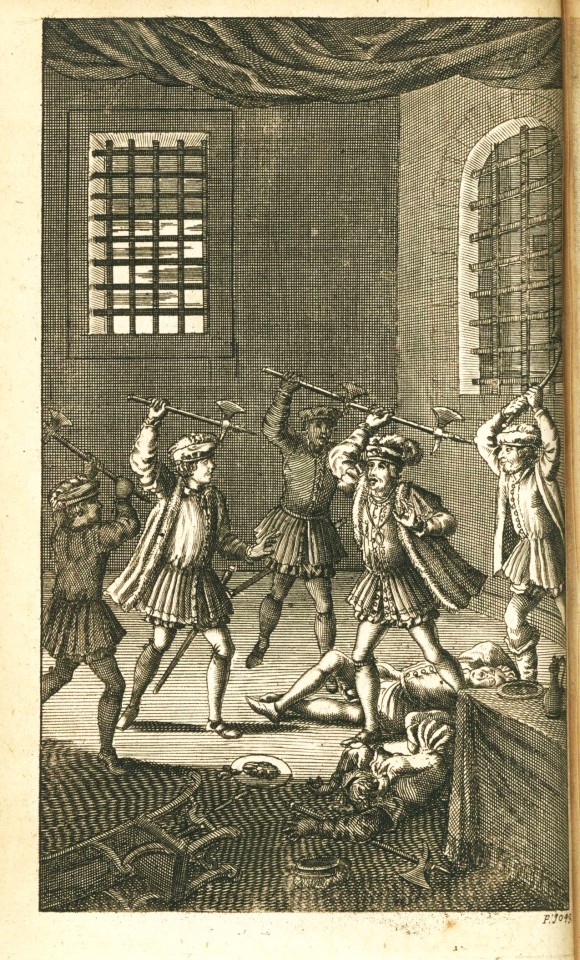
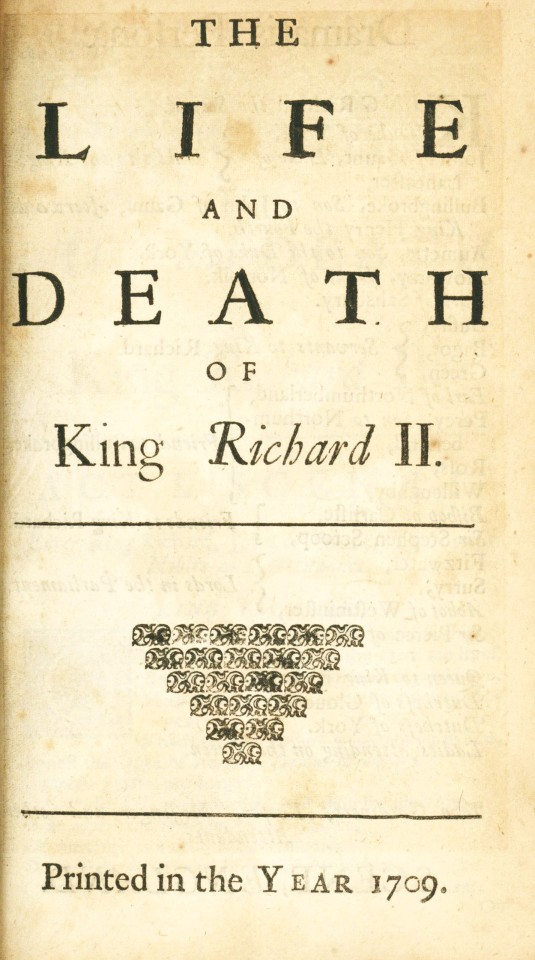



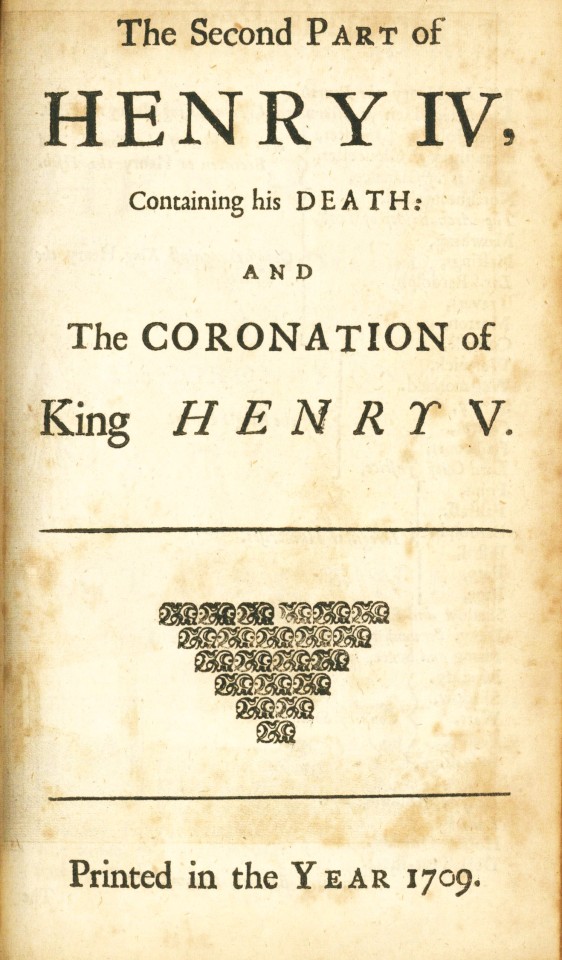

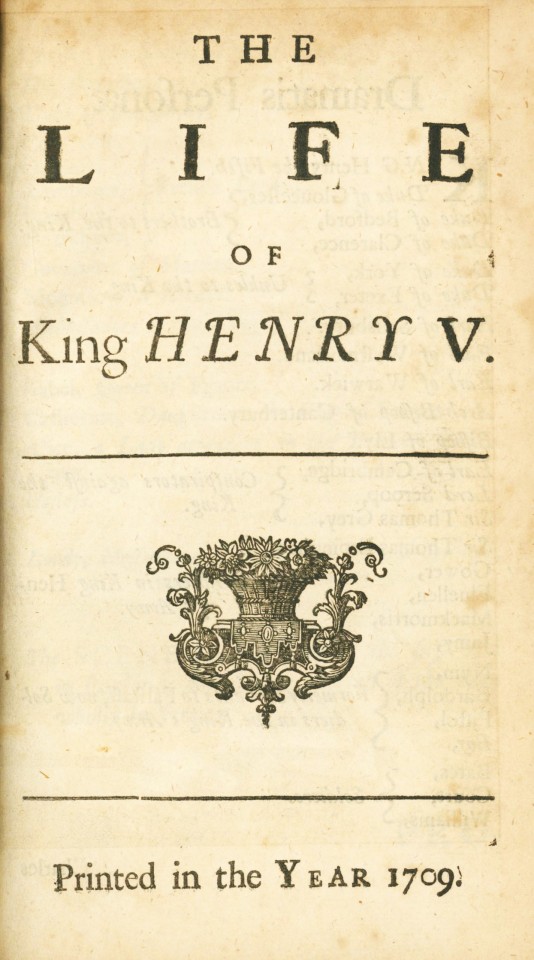
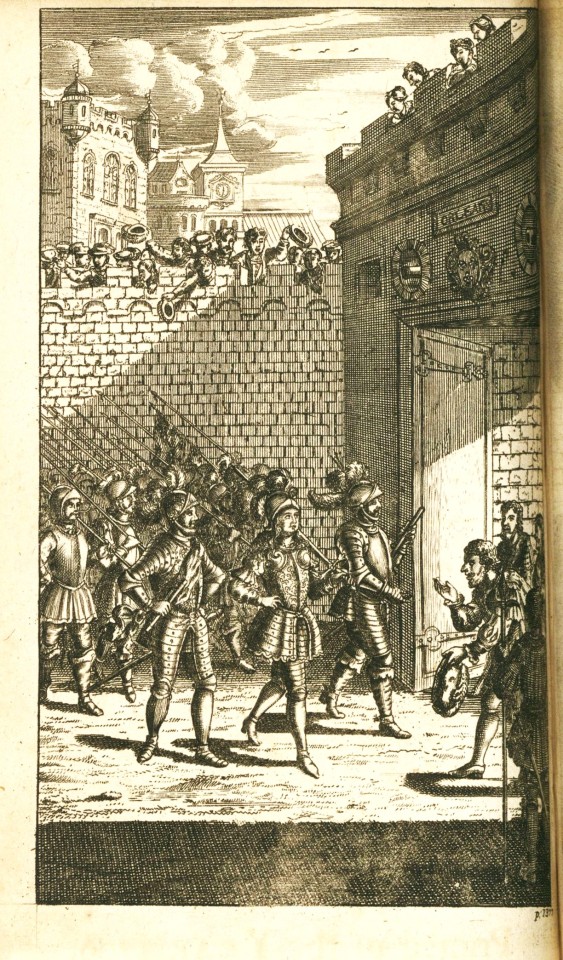



Shakespeare Weekend
We are halfway through Nicholas Rowe’s (1674-1718) The Work of Mr. William Shakespear; in Six Volumes! Published in London in 1709 by Jacob Tonson (1655–1736), this second edition holds an important place within Shakespearean publication history. The Work of Mr. William Shakespear; in Six Volumes is recognized as the first octavo edition, the first illustrated edition, the first critically edited edition, and the first to present a biography of the poet.
This week, we explore the third volume of The Work of Mr. William Shakespear; in Six Volumes. The third volume encompasses historic plays including a Shakespearean Henriad depicting the rise of English kings. The volume is comprised of King John, King Richard II, Henry IV Part I, Henry IV Part II, King Henry V, King Henry VI Part I, and King Henry VI Part II. While the plays have recurring characters and settings, there is no evidence that they were written with the intention of being considered as a group. A full-page engraving, designed by the French Baroque artist and book illustrator François Boitard (1670-1715) and engraved by English engraver Elisha Kirkall (c.1682–1742), precedes each play.
In addition to Rowe’s editorial decisions to divide the plays into scenes and include notes on the entrances and exits of the players, he also normalised the spelling of names and included a dramatis personae preceding each play. The only chronicled critique of Rowe’s momentous editorial endeavor is his choice in basing his text on the corrupt Fourth Folio.


View more volumes of The Works of Mr. William Shakespear; in Six Volumes here.
View more Shakespeare Weekend posts.
-Jenna, Special Collections Graduate Intern
#shakespeare weekend#nicholas rowe#the works of mr. william shakespear#king john#king richard II#Henry IV#King Henry V#King Henry VI#jacob tonson#henriad#François Boitard#Elisha Kirkall#engravings
63 notes
·
View notes
Text

"While waiting [for Émilie], [Voltaire] seemed attached to several horses, for he had made the little 'abbé' Linant come to Rouen and even offered hospitality to another young man named Lefebvre, a budding poet aged 20 like the other, and like a certain Lamare, the third ephebos that he cosseted and who was also an abbot. The first had already made a trip to Paris to keep his acquaintance with [Lord Bolingbroke]. This boy seems to have had equivocal relations with Cideville, which makes this phrase from a letter from Voltaire from May 29 to this advisor, a letter prior to the return of the 'chubby abbot', amusing: 'When he wants to come back to Paris, I will rent him a hole near my house; he will furthermore be the master of dinner and supper every day in my retreat.' He practically offered him to share his bed. The presence of these two young men by him distinctly reminds one of the young 'writers' that the abbé Desfontaines, the famous pederast, had had near him for so long, and who served at once as mignons and secretaries. Even if he did not take up with them the liberties that he had formerly had with Thieriot in M. Alain's study, he still cherished this extreme familiarity with young people." - Voltaire et Frédéric II by Roger Peyrefitte.
FIRST off, why are we stating as fact that any "liberties" happened with Thieriot. There is zero proof. There is circumstantial evidence in that you could interpret V's letters to Thieriot as being kinda gay and then infer that "liberties" occurred, but even if we are interpreting the letters as gay, that's still a big jump to make from 'V felt more than just friendship for Thieriot' to 'they definitely slept together', which there's no real evidence for.
Second of all, there is no evidence of anything going on with Linant. Nancy Mitford suggested it as well, with the reasoning being that Linant was stupid and useless and why else would V keep him around, which is the same argument that's been used for V and Thieriot being gay. But a relationship between V and Linant being a possible explanation for something does not mean that that's evidence for a relationship, and Mitford doesn't cite anything V wrote as potential proof. And also like. The man resorted to full-on referring to his plays + la Henriade as his children to an extent and (unofficially) adopted Marie-Françoise and pretty much Reine Philiberte and Villette as well. And reading the letters about Linant from V to Cideville, and V talking about Linant's improvements in writing, it very much sounds like he's just proud of Linant and sees himself as a father figure. Again, also just a possibility, but it works equally well as an explanation and it fits into an already established pattern, plus it's based on what V actually wrote.
Thirdly, I would like to emphasise the "aged 20". "Aged 20" is not the same as what the "famous pederast" was doing.
Fourthly, saying that that quote about Linant coming back to Paris is "practically offering him to share his bed" is the single most batshit far-fetched gay interpretation I have ever seen in my life, and I was in the Hamilton fandom for three years. Genuinely how do you even get there. Bitch could've invited Linant to stay with him but he specifically said he'd rent him a different place. How does that equate to inviting him into his bed. This part alone is what's gonna convince me of Peyrefitte's bottom V thesis cause I can interpret two letters in that way and I can no longer be self-conscious about how I interpret literally anything, because it's still gonna be 10 miles more sane and evidenced than anything Peyrefitte's said.
@enlitment I apologise deeply for making you read this, but here's a taste of why the book sucks... Turns out I actually stopped reading on page 20 lol cause that's where my yelling at Peyrefitte in the margins stops.
#voltaire#voltaire et frédéric ii#roger peyrefitte#as for V and thieriot; V himself says that he cares about Thieriot more than ordinary friendship could allow#but that doesn't have to mean romantic; imo it doesn't. it can just mean that there's a lot of room under the label of platonic and that-#- there aren't hard and fast lines.#and it can be queer without being gay
10 notes
·
View notes
Text
ok not a main poll i doubt we're having any of those anymore
there's another one too in a bit but this one is less important so have it first!
bear in mind that it took me 7 months to read wap. preferably something relatively short
for other books, classic lit please! i read practically nothing else
#bazposting#not a main poll#classic literature#moby dick#the strange case of dr jekyll and mr hyde#crime and punishment#merchant of venice#fahrenheit 451#the idiot#the henriad#les miserables#1984
56 notes
·
View notes
Text
well, @baronetcoins has tagged me once again in that good old game of:
post the names of the files in your wip folder, regardless of how non-descriptive or ridiculous. let people send you an ask with the title of what most intrigued them, and then post a little snippet or tell them something about it. if you want, tag as many people as you have wips.
here we go again. due to the various wretchednesses, I am only going to list the ones upon which I've actually worked in the last months... also if I wrote out all of them, we'd be here all day for sure.
flight of the heron:
lake trip
wormsfic
french vacation / a season in exile
winter birds
first snowfall at ardroy
sharpe:
wolf run free / werewolf au
ladyhawke au 2
babygirl you're coolawesome / the one with the dress
seville oranges
waterloo 2 / causeway
kissing the homies goodnight & kissing the homies 2: bro hookup
hard luck for you
kidnapped:
wood-god / shapeshifter alan / a bonny moor-hen
the low road
henriad:
werewolf montjoy
temeraire au
double-cast au
all the other fic:
pirates of the caribbean - two magicians / shapeshifter swann
the body snatcher - fun for boys (with scalpel!)
eagle of the ninth - a fire-breather of hispania
original stories:
oak savanna vampire
blood of the ash-tree
...there are still so many of them and I don't feel concerned about that, why would you ask me that. for today I shall simply say If You Want To Share, Consider Yourself Tagged.
#one of those tag things#this is what happens when you stop writing for several months because the entire inside of your skull is full of wickedness#I have drained off some of the wickedness and hopefully the word producer will be properly up and running again soon#<- this would be good because guess who failed a writing-based class this term just past :\
7 notes
·
View notes
Text
Top Five Douglas Rain Recommendations From Yours Truly
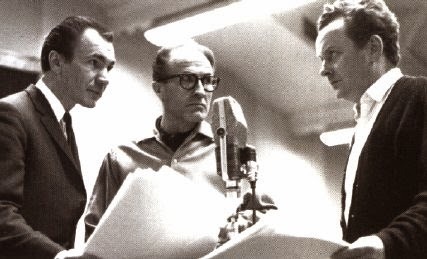
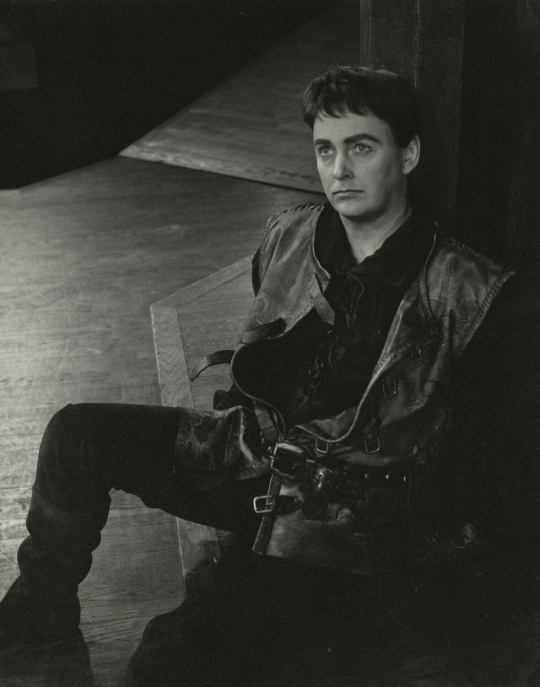
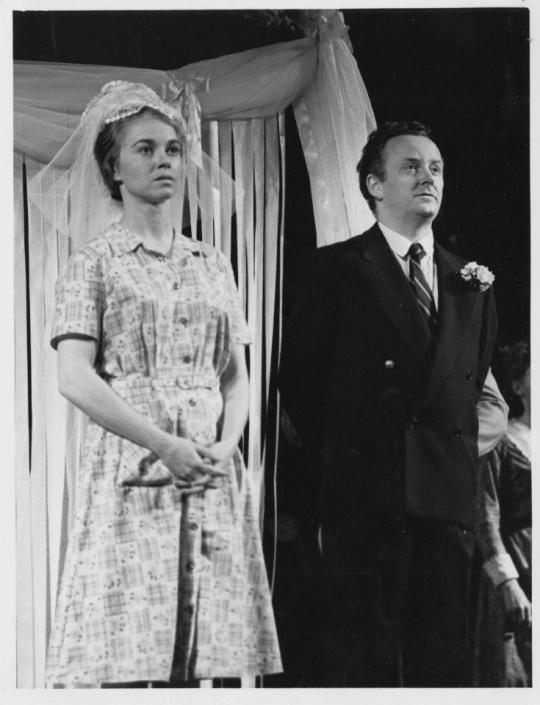
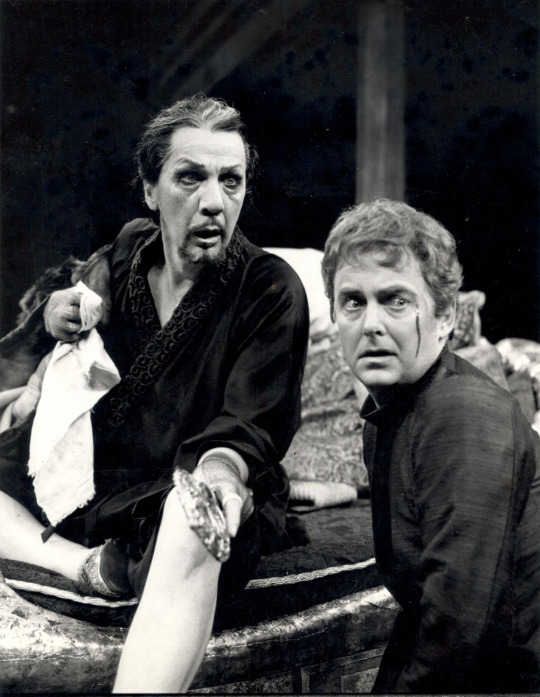
You want to see more of Douglas Rain, but you're not sure where to start? Well, do I have the thing for you! As the internet's most preeminent Douglas Rain expert (except for Gerry Flahive I guess, but he's kind of slow at answering emails and more focused on other stuff these days. If he wants to reclaim the title, he can meet me in the parking lot <3), I've made you a handy little list of some of my personal favourite performances by DR that I think you should see and/or hear!
And by 'little' I mean 'I got way too into this, so it's pretty long now'. I put it under a cut; you're welcome.
In the interest of fairness, I've chosen one performance from each of his fields of work (namely: ON STAGE, RADIO WORK, DOCUMENTARY NARRATION, TELEVISION and FILM). Please know, however, that I can give reviews of basically everything in the masterpost, so if you're interested in hearing about any of them, feel free to shoot me an ask!
Without further ado, let's get into it...
-
ON STAGE: Henry V (1966)
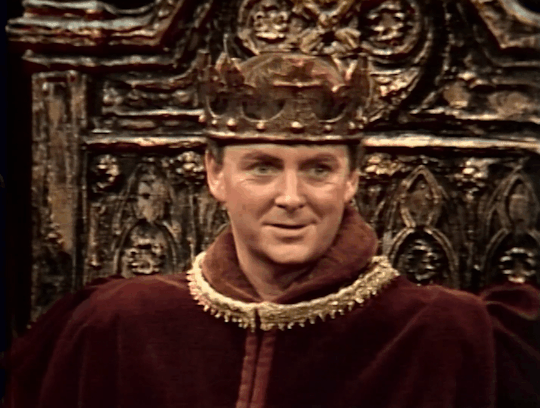
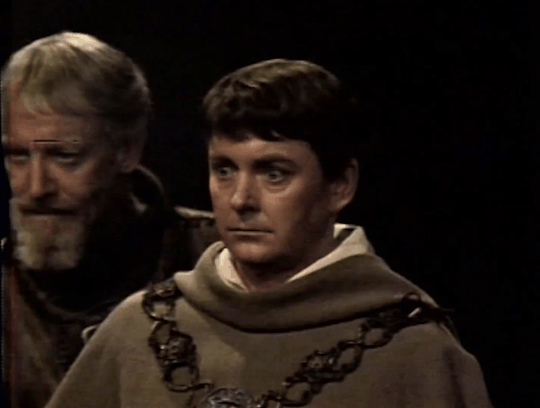
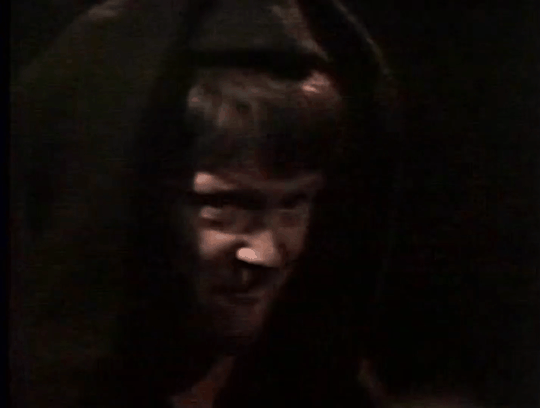
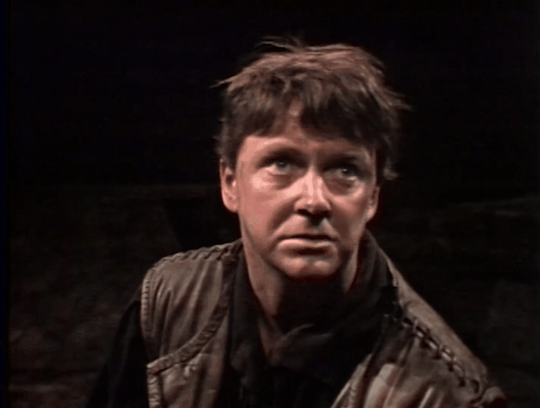
Okay, this one's teeeechnically a TV movie, but it's adapted from Stratford's staged production, so I'm counting it. It's also a rare treat in that we get to see DR in colour! (Everybody say THANK YOU to David Rain, his son, for bullying the Festival into restoring this production and adding it to their online catalogue. I owe him my life.)
This is one of Shakespeare's histories, part of the Henriad (aka the collection of plays about the accomplishments of various English kings). Henry V, the main guy in this one, is actually the crowned version of Prince Hal from both parts of Henry IV, a role that DR had played previously at Stratford, so this is a fun bit of character continuity for him! The play centres around the king's invasion of France, with a lot of ruminating on hope and despair and duty and bravery. Harry - as he is affectionately referred to on occasion - is really going through it, and DR portrays him with such emotional intensity. He's proud, he's fierce, he's clever, he's a BITCH and I like him SO MUCH.
The book has been edited down slightly to fit into a two hour runtime for television, but beyond a few... very funny jumpcuts, it's not really noticeable at all. And while the sets are kept mostly simple, the costumes are gorgeous. I went in not expecting much (a mistake I keep making when approaching Shakespeare plays, for some reason lol), and was thoroughly entertained the whole way through!
It also contains the transcendentally funny line, "Tennis balls, my liege!" because Shakespeare was the most hysterical motherfucker on planet Earth. It makes sense in context, I promise.
Can be found on Stratfest@Home, the online streaming service of the Stratford Festival (there's a 7-day free trial period if you sign up). You may also check my masterpost of performances for a possible alternative, but shhh.
-
RADIO WORK: Fifth Business (1980)
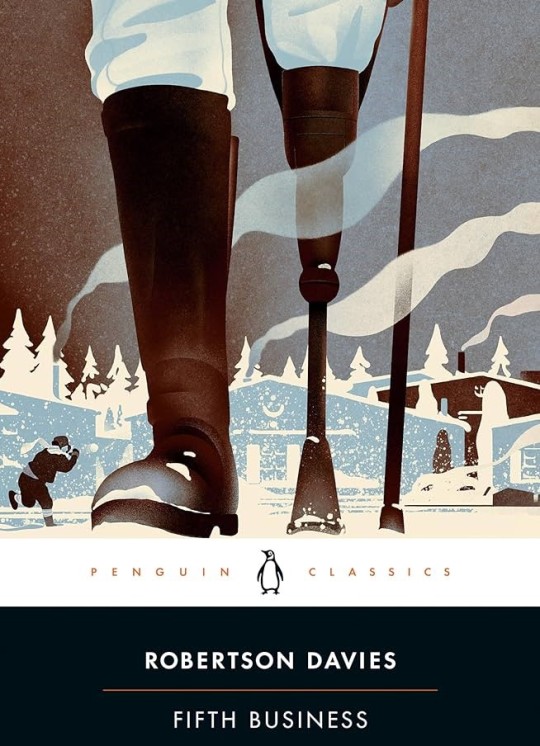
I love this one; it's literally so fucking funny. This radio play is a dramatisation of the 1970 novel of the same name by Robertson Davies. Fifth Business recounts the life story of Dunstable "Dunstan" Ramsay, from his boyhood in an idyllic (on the surface only) Canadian village to his experiences in the First World War, his career as a teacher and all the loves and complications he runs into, and the formative experiences peppering his life where he's never quite the main character. He is instead 'fifth business' - neither hero nor villain, but still integral to resolving the play's plot. Ramsay is clever, sarcastic and a goddamn weirdo who's obsessed with saints for non-religious reasons. He dodged a snowball as a kid and the consequences of that haunt him throughout the entire book.
The radio drama features a whole cast of actors, including of course DR as the protagonist (who also narrates everything btw), doing an absolutely delightful job. Fellow Stratford actress Martha Henry, who also happened to be his wife at the time, is in it too!
The entire drama is delightful, honestly. I liveblogged my experience listening to it for the first time, and man there is some wild shit happening in this novel. The entire things is about three and a half hours, but it really doesn't feel that long.
Can be found (in eight parts) on YouTube or on Archive.org. (Or in a junkbox on a sidewalk in Toronto. I'm still baffled by that.)
-
DOCUMENTARY NARRATION: Universe (1960)

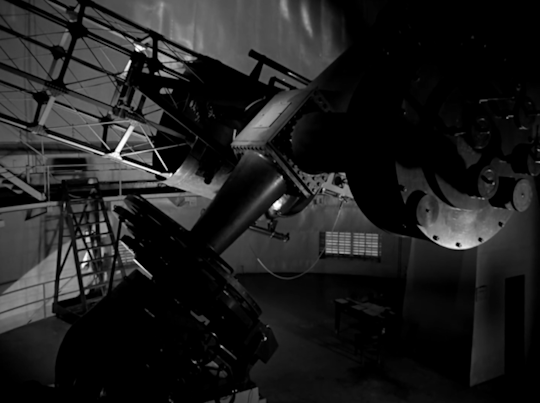
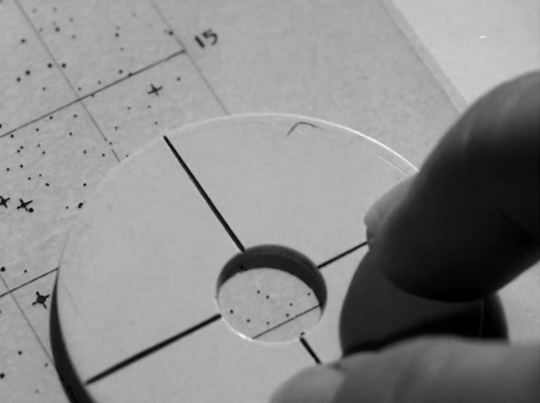

A classic. Documentaries make up a sizeable chunk of the masterpost (thanks to the NFB website and archive channels on YouTube), so there were more options in this category than in any of the others. But I decided to go with this particular gem of a documentary.
It's about - who would have guessed - the universe, featuring the most advanced scientific knowledge of planets and stars at the time. The special effects are also quite impressive - if you move around Space Odyssey circles, you may have heard that the visuals of this documentary were a major inspiration for 2001. Also, DR's narration in Universe is what brought him to Stanley Kubrick's attention. You can probably guess how that ended. (Gerry Flahive has some articles about the whole thing if you don't.)
Anyway, Universe is a beautiful and meditative look at our galaxy and the many things it contains, and DR's narration is absolutely lovely. It clocks in at just under half an hour, so not that big of a time commitment either.
Can be found on YouTube or on the NFB website.
-
TELEVISION: William Lyon Mackenzie: A Friend To His Country (1961)
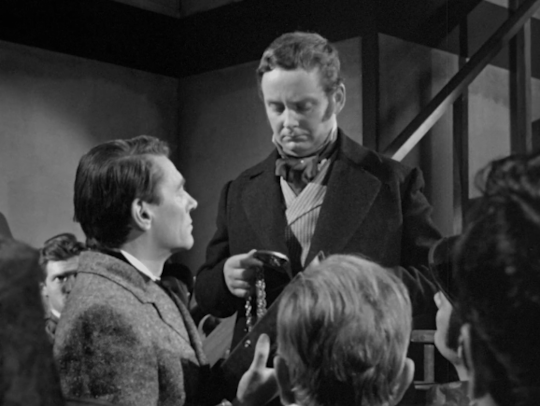
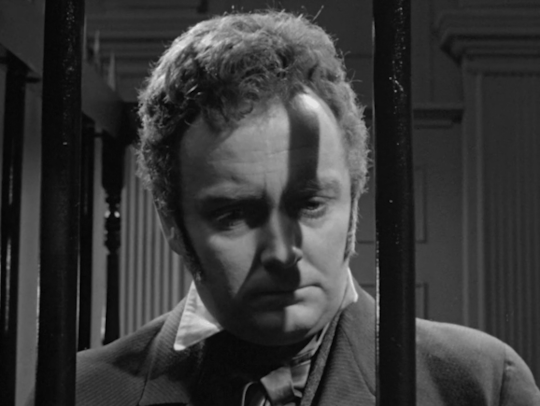
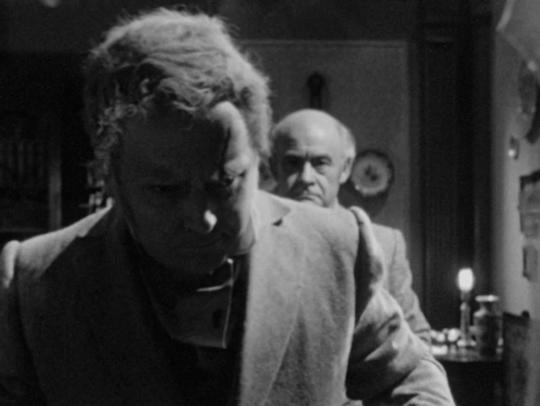
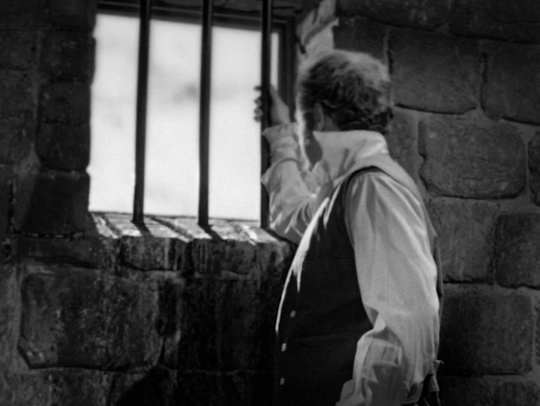
It's so hard to find old Canadian TV shows anywhere online and I'm forever bitter about it. Our options here are incredibly limited as a result, so you're just going to have to accept that I'm recommending you a historical short film from 1961, alright? This is as difficult for me as it is for you.
Unsurprisingly, this movie is about William Lyon Mackenzie, who was... *checks Wikipedia* "a Scottish Canadian-American journalist and politician." Yes, DR is doing a Scottish accent in this role. Yes, I adore it. I know very little about Canadian history, so I can't exactly speak to the film's accuracy, but I found it charming and DR is doing a very good job. Most of the half hour runtime is spent on Mackenzie's various political struggles (some sort of failed revolution, I gather, followed by exile in the United States and some jailtime) and him trying to protect his family. His wife is played by Canadian actress Kate Reid in this movie, which I personally find very funny for... reasons. IYKYK.
Can be found on YouTube or on the NFB website.
-
FILM: OEDIPUS REX (1957)

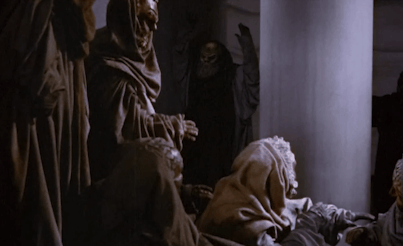
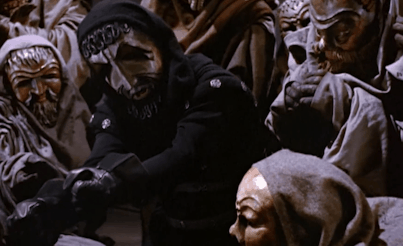
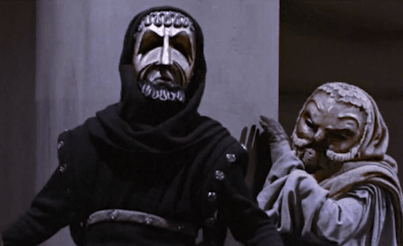
I'm sort of cheating again, but the only other options in this category that I have access to are the two Space Odyssey movies, and they seemed like too basic of a choice. So have some more drama instead! This is also a filmed version of one of Stratford's plays, but released in theatres this time.
Oedipus Rex is a breezy 87 minutes and adapts the English translation by Yeats of the classic Greek tragedy by Sophocles, with a little added prologue to set the scene. It was directed by Tyrone Guthrie, who you might remember as the Big Man from The Stratford Adventure. Or from the fact that he was a pretty famous theatre guy. If you need a refresher on your Greek myths: Oedipus was the guy who was prophesised to kill his father and marry his mother. He got done dirty by Freud somewhere down the line.
DR plays the role of the Messenger, a minor part who recounts some of the most famous plot points of the tragedy of Oedipus, which they couldn't show onscreen/onstage. Granted, he's only in this one for like five minutes, but he really rocks up to crash the party wearing the coolest outfit in the entire show. And yes, everyone in this production is wearing Greek theatre masks, so you can't see his face. You get to hear his voice though - and watch his captivating body language!
Can be found on YouTube. Or you can probably buy it on DVD if you really want to; idk, I'm not the boss of you. (I've also clipped his scene if you really, really don't want to watch the whole play. I get it's a big ask. Really beautiful production though, seriously!)
#douglas rain#stratford festival#national film board of canada#hal 9000#2001 a space odyssey#(this is me loudly going PSPSPSPSPSPSPSPSPS)#photo evidence#gifs of mine
6 notes
·
View notes
Note
☔
[wip game]
☔Is there a fic concept you have that you'd like to just explain and share because you're not sure you'll ever write it? If so, what is it?
Please allow me to introduce you to my self indulgent Shakespeare AU!
It would basically be an Actor AU that is also my apology to Luke for what I did to him in TUAP as well as a place to put all my Shakespeare love and knowledge.
The concept is the characters working as actors in a summer Shakespeare festival out on Long Island (if you've seen the TV show Slings and Arrows, it's a bit like that, but by no means a direct AU). It would take place over a rehearsal period and summer production season, as Percy and Annabeth slowly reconnect and fall in love, despite not having any on-stage romantic moments.
The backstory is, Percy and Annabeth met as kids at the adjacent theater camp for the festival, and returned year after year. They grew apart in college, as Annabeth went to Yale for drama (disappointing her Harvard family), and Percy stayed in New York. He went to City College and took additional acting classes (fuck NYU, he did not go to NYU. No way he's paying for that). This is her second year performing in the festival, but Percy's sixth year or so. The year before, she was Cordelia in King Lear, Isabella in Measure for Measure, and Celia in As You Like It. Percy was Casio, Edgar, and Orlando. They've never played romantic partners (In MFM, they were brother and sister).
This year, their characters actually have very little on-stage time together, but they still find time to reconnect through rehearsals. There was some spark the summer before, but they were mostly getting reacquainted. This year, they're already starting out closer friends, and now is the perfect time for more to start stirring between them. Show-mance ensues.
The summer of the fic, they are doing the full Second Henriad (Richard II, Henry IV parts one and two, and Henry V).
Percy is Hal/Henry V, and it's his first summer a major star for the festival, and he's hoping this will really jump start his professional performance career, and get him into bigger festivals and New York shows. He is basically the lead for three of the four shows, and has the longest arc. It's also a role with lots of complex daddy issues, so he kills it. And he gets to sword fight. He's great at stage combat.
Luke is Richard II, Hotspur, and the French dauphin. He's a bigger star, but he has come back to the smaller festival to be Richard II and Hotspur, two of his dream roles. In this AU, he's much more of a big brother figure to both Percy and Annabeth. Although, he does tend to get cast as antagonists.
"Last year I was Angelo in Measure for Measure and Edmund in King Lear, and this year I'm Hotspur. What is it about me that screams villain? Antagonist?" Luke asked.
"Facial scar," Annabeth said simply at the same moment that Percy hit him with: "Blond."
Also Luke playing a character named "Henry Percy" does cause constant confusion, given that Henry V is irl a Percy.
Annabeth plays all the major women: Anne of Bohemia, Katherine Percy (Hotspur's wife), and the French princess Katherine. (Originally she was going to be the production dramaturg, but that is simply to close to my dissertation research, and it would get a little too specific for a fanfiction).
She spends the whole summer complaining about the choice to do a series of plays with a dearth of female characters. Despite this, she is the only principal actor with a role in all four shows ("Hardly a principal actor! You have more lines in 1 Henry IV than I have in all four plays combined!"). While she does have a role in all four shows, this is certainly a downgrade from the characters she got to play the year before. ("We could have at least added Merry Wives of Windsor!")
This does mean Annabeth technically gets to play Percy's wife, but it's hardly the great on-stage romance they could have had if she'd landed the role of Rosalind in As You Like It, opposite his Orlando. And she's still mad she didn't get Rosalind. She thought she'd be perfect for it. But Chiron wanted her as Isabella more.
3 notes
·
View notes
Text
Shakespeare Comparisons: Young Royals and the Henriad
I saw this post comparing Young Royals to Julius Caesar the other day, and I actually don’t think Young Royals is that closely connected to Julius Caesar. Sure, August betrays Wilhelm. But there are lots of things that don’t match up at all: Brutus, not Caesar, is the protagonist of that play, Caesar is not a contemporary of Brutus but something of a father figure, and Brutus and Cassius decide to kill Caesar because Caesar is threatening to become king and end the Roman Republic. None of those things are actually very similar to August and Wilhelm’s characters or relationship.
There is, however, a glaringly obvious Shakespeare comparison available to us in the form of the Henriad, or the plays Henry IV Parts 1 and 2 and Henry V. The protagonist of Henry IV Parts 1 and 2 is actually Prince Hal, the prince that will go on to become King Henry V in the final play. At the beginning of the first play, he spends most of his time shirking all royal duties, drinking in a tavern in Eastcheap with his perpetually drunk and broke friend Falstaff. Over the course of Henry IV Parts 1 and 2, Hal has to wrestle with the idea that he will soon inherit the crown, and decide how and when to step up to this responsibility. These plays are literally about the coming of age of a young and erstwhile prince just like Young Royals.
There are few similarities and differences between the stories that I think are interesting to explore. In the Henry IV Parts 1 and 2, Henry IV struggles to maintain control of the crown. He took the throne as a usurper, defeating Richard II, and throughout the course of these two plays he fights to defend his position from rebels who would in turn usurp him. Because of this precarity, he’s aware of the fact that Hal will have a hard job as his successor, and that currently he’s showing no signs of being up to the task. He instead sings the praises of Harry Percy, also known as Hotspur, the young rebel who is Hal’s age currently vying for the throne. Despite Percy being his enemy, Henry IV recognizes all of the qualities of leadership that Percy displays, and wishes that he were his son instead of Hal (“In envy that my Lord Northumberland/Should be the father to so blest a son/A son who is the theme of honour’s tongue”- Henry IV Part 1, Act 1, Scene 1). But Percy is also hot-tempered and impetuous and possessed by toxic masculinity, and it becomes clear to the audience that he would not be a good king. When he learns that the reinforcements he expected are not going to arrive, he rushes into battle against Henry IV’s forces anyway, allowing Prince Hal to kill him.
In Young Royals, there is a similar precarity to the monarchy, not because someone is threatening to overthrow Kristina, but because modernity threatens to make all contemporary monarchy obsolete. Because of this, Kristina puts a lot of pressure on Wilhelm to maintain the image of the crown. In addition, August becomes a pretty neat parallel to Percy. August succeeds at fulfilling the expectations of a nobel placed upon him: he is straight, feels comfortable wielding authority, and actively wants power where Wilhelm rejects it. August is in some ways the favored son of the royal court, and his promotion into the line of succession feels reminiscent of the way that Henry wishes Percy could be his heir instead of Hal. Similar to Percy, August’s hamartias also revolve around his impetuousness, anger, and complicated relationship with masculinity.
There’s an incredible scene in Henry IV Part 2, where Prince Hal is called to his father’s deathbed. Mistakenly thinking that Henry has already died, Hal tearfully takes the crown from his father’s pillow and places it on his own head. Henry later comes to and rails at his son, accusing Hal of wishing him dead and of being too impatient to assume Henry’s power. Hal protests; he meant only to wrestle with, and lay blame upon, the crown which he assumed had already killed his father. Hal speaks of the crown as a metaphor here, as something that sucks the life from those that are forced to wear it:
Coming to look on you, thinking you dead, And dead almost, my liege, to think you were, I spake unto this crown as having sense, And thus upbraided it: “The care on thee depending Hath fed upon the body of my father; Therefore thou best of gold art worst of gold. Other, less fine in carat, is more precious, Preserving life in med’cine potable; But thou, most fine, most honored, most renowned, Hast eat thy bearer up. (Henry IV Part 2, Act 4, Scene 3)
Hal putting on the crown in this scene is a significant step towards his ultimate acceptance of his responsibility to rule. Even though he believes the crown to be a kind of poison, he knows he must wear it. It points to the self-sacrificing, humble king he will become in Henry V.
There’s no direct allegory to this scene in Young Royals, but the discussion of the crown as a kind of poison feels very apt for the themes of the show. As Lisa is fond of saying, Wilhelm being queer would not be an issue if it weren’t for the spectral crown hanging over his family and his destiny. This scene also makes me think of how Wilhelm asks Kristina to just be his mother and not the queen for once in season 2. Even though the crown has not literally affected Kristina’s health, it has killed off the part of her that is Wilhelm’s mother first. The crown has permanently altered their relationship.
I think if we’re drawing parallels between Young Royals and the Henriad, there’s a couple of different ways we can find connections between Prince Hal’s days of frivolous drinking at a tavern in Eastcheap and Wilhelm’s time at Hillerska. Eastcheap was a market street in the City of London (by which I mean the historic city/The Square Mile, not what we think of now as the entire city of London.), far away from any palace, which would have been populated by working class folks. The tavern is a place where Hal can be with his friends, away from the pressure of royal life. So in some ways, Hillerska works as Wilhelm’s Eastcheap. Or maybe I should say Erik’s– Erik’s description of sowing his wild oats and enjoying his time at school before things got serious seems very similar to Prince Hal’s attitude. Or perhaps more accurately we could say that Wilhelm’s adventures in Bjarstad are analogous to Prince Hal’s time in Eastcheap. This is Wilhelm’s predominant exposure to working class people, and he forms a close connection with Simon much like Hal does with Falstaff. (This however, is where the similarities between Falstaff and Simon end).
At the end of Henry IV Part 2, Hal is crowned King Henry V, and willingly renounces his old way of life. When he sees Falstaff at his coronation, he tells him that he should “presume not that I am the thing I was” (Act 5 Scene 5) and banishes him. To me this feels reminiscent of the way Wilhelm renounces Simon publicly at the end of season 1. The difference here is that by the time Prince Hal renounces Falstaff, his transformation into King Henry V is complete. But Wilhelm’s rejection of Simon only occurs at the end of his first act, while he still has all of seasons 2 and 3 to continue to grow and make different decisions. Because of this I think it’s important to keep in mind that we don’t need to draw one-to-one comparisons between Young Royals and the Henriad, or any other classic text, in order to acknowledge that the two works are playing with the same themes. Lisa and the writers of Young Royals didn’t set out to create an updated version of Prince Hal in Wilhelm, but I think it’s impossible to write about the coming of age of a young prince in the Western World without being influenced, at least indirectly, by Shakespeare’s work.
On a personal note, I think it’s amusing that I've been obsessed with the Henriad for about a decade, but it took me writing this post to realize that this long standing interest probably primed me to love Young Royals. I really am consistent if nothing else.
Thanks to @bluedalahorse for helping me organize my thoughts on this as always. If there are any other Shakespeare/Hal lovers in the Young Royals tag I would love to hear your thoughts on these comparisons. And if this has you interested in the Henriad and you want to check out a production, I highly recommend the recorded Globe productions starring Jamie Parker as Prince Hal/Henry V.
19 notes
·
View notes
Note
If you have other thoughts about other mdzs's charac (or again jgy!) in other role, I would love to read them!
Thank you for your patience, anon! I meant to answer this yesterday along with the one about JGY and Edmund. Each of these involves characters from the Henriad--Richard II, the two Henry IV plays, and Henry V.
-Hotspur, my beloved and cherished son who appears briefly in Richard II and is the antagonist (in the "opposes the protagonist" sense, not the "is a villain" sense) of 1 Henry IV, is the midpoint between Jiang Cheng and Nie Mingjue. Hotspur is essentially a child soldier; his descriptors suggest that he's a young teen when he joins his father in deposing Richard II in favor of Richard's cousin Henry IV. When we see him as a young adult in 1 Henry IV, he's fully immersed in warfare as a way of life, and while he's won great renown, he's... not really doing so great. Some of his lines are alarmingly visceral (ex: "they come like sacrifices in their trim/ and to the fire-eyed maid of smoky war/ all hot and bleeding we will offer them."), and his wife's concerned speech describing his behavior in II.3 reads like a checklist of PTSD symptoms. Hotspur also wholeheartedly believes in his personal code of honor and is clinically incapable of guile in a way that comes off to me as almost childlike. If a cause is just, then it will prevail no matter the odds (spoiler: it does not)! He loves his family and trusts that they have his and the kingdom's best interests in mind (spoiler: they do not)! Basically every line Hotspur speaks in Acts IV and V of the play could be given to Mingjue and you'd only need to replace all the proper nouns.
(Hotspur is also canonically SUCH a horse girl and so is Mingjue in my heart.)
Meanwhile, on the Jiang Cheng side of things, Hotspur also wants SO badly to do a good job. He is so so SO determined to fulfill his roles as a knight and as a son to their fullest extent, and has nothing but contempt for Hal because Hal, despite being heir to the throne, does jack shit and spends all his time drinking and pickpocketing for funsies. For all his impetuousness and general lack of an inside voice (which is NOT a Jiang Cheng problem), he shows flashes of being a strong leader--particularly in his speech outlining his grievances against Henry IV in IV.3. Personality-wise, Hotspur is filled with BIG FEELINGS and most of them manifest as cantankerousness. He is prickly and argumentative by default, which makes him lowkey one of the funniest characters in the play (see: his soliloquy arguing with a letter at the top of II.3, his entire exchange with Owen Glendower in III.1), and also make his moments of genuine vulnerability hit hard (ex: "come, wilt thou see me ride?" in II.3 and his death speech in V.4).
-On the flip side, Huaisang reminds me of Prince Hal. Remember how I said Hal doesn't do jack shit? Hal's flop era is deliberate. He knows he can't run from his responsibilities forever, so he's slacking off to lower people's expectations for him. The first soliloquy we get from him in I.2 is an EXTREME Huaisang mood and I'll try to trim it to the most relevant bits:
I know you all, and will awhile uphold The unyoked humour of your idleness: Yet herein will I imitate the sun, Who doth permit the base contagious clouds To smother up his beauty from the world, That, when he please again to be himself, Being wanted, he may be more wonder'd at... I'll so offend, to make offence a skill; Redeeming time when men think least I will.
His flop era does NOT endear him to his father, who wishes he were an accomplished warrior like Hotspur, and their relationship is rocky. When Hal becomes king upon Henry IV's death, Hal decides to jettison his past friendships, quash the joyful aspects of his identity, and go do war crimes in France. I describe Hal's actions in the play Henry V as "Hal doing his best Hotspur impression," except that whereas Hotspur honest-to-god believed he was fighting for justice, Hal is more calculating. Sure, he gives us the "once more unto the breach, dear friends" and "we few, we happy few, we band of brothers" speeches, but he also cheerfully threatens mass slaughter in response to an insult in I.2 (and ratchets up the threats in gruesome detail III.3).
-Huaisang is also Hamlet, of course, but I don't personally subscribe to the "Huaisang was always sooooo scared of JGY" interpretation of the timeskip. Fear makes you act with urgency, as Hamlet very much does post-Mousetrap and post-return to Denmark. Readers give Hamlet a lot of shit for dithering on killing Claudius, but he does get the job done in just a couple months (much of which he spends offstage with pirates) because all he wants is Claudius to be dead. Huaisang takes his sweet time because he wants JGY utterly destroyed, which is more a Hal vibe.
-Lan Xichen is NOT Richard II at all. I'm not even going to explain why he's not because he's not. However, Richard's big soliloquy when he's imprisoned alone in the penultimate scene of the play is VERY MUCH Lan Xichen in conclusion. It's long--66 lines!--but I will excerpt the relevant portion.
Music do I hear? Ha, ha! keep time: how sour sweet music is, When time is broke and no proportion kept! So is it in the music of men's lives. And here have I the daintiness of ear To cheque time broke in a disorder'd string; But for the concord of my state and time Had not an ear to hear my true time broke. I wasted time, and now doth time waste me; For now hath time made me his numbering clock: My thoughts are minutes; and with sighs they jar Their watches on unto mine eyes, the outward watch, Whereto my finger, like a dial's point, Is pointing still, in cleansing them from tears.... This music mads me; let it sound no more! For though it have holp madmen to their wits, In me it seems it will make wise men mad. Yet blessing on his heart that gives it me! For 'tis a sign of love; and love to Richard Is a strange brooch in this all-hating world.
I JUST!!!!
#Richard II and 1 Henry IV are two of the very best Shakespeare plays and they are criminally underrated bc the history confuses people#(Henry V is good IF the production understands that Hal's a fucked up little guy who's chosen imperialism as a coping mechanism)#(if you take it at face value then it's just warmongering nationalism)#oh a further note on Hotspur from a NMJ sense! in the production I was in years ago the way Hal killed me#is that he cut at my head so I did the guard to block the strike that was Supposed To Happen#but! he feinted! and got me in my stomach (which was fully exposed bc I was guarding in the way that fights are Supposed To Work)#however I was a foot shorter than Hal so it was even MORE of a dick movie on Hal's part bc at least NMJ is tall
17 notes
·
View notes
Text
Where’s Feste? Rambling about Twelfth Knight
So a week or so ago I finished reading Twelfth Knight by Alexene Farol Follmuth. It’s a retelling of Twelfth Night by everyone’s favorite builder of bridges of ziggurats William Shakespeare. Takes Twelfth Night to a High School. Orsino is Jack Orsino, star running back and Student body President who gets a bad injury. Viola is now Viola or Vi Reyes…fan of Ttrpgs, Ren Faire and not Game of Thrones stand in War of Thornes (which disappointingly is not just a historical drama of the Lesser Henriad…dang) she plays as Cesario online to avoid misogynistic assholes. There’s a lot great about this. How both navigate fandom, and social circles besides. The fact they two know eachother, don’t get along, then later do (it’s a retelling of Twelfth Night of course it’ll be romance). The fact that Orsino is asking irl Viola to help figure out why his girlfriend is wanting a break….and like…dude isn’t a creep about it. He’s just…wanting to know? This is a very likable Orsino. There’s a lot more but there that question in the title. Where’s Feste?
To those unaware, Feste is the Fool in Twelfth Night. Noted as Clown in stage directions, he’s in my opinion one of if not the best Fool in the Cannon. At the very least the best of the Armin performed Fools of the middle to later plays. The Kemp clowns of earlier works…that’s a matter of debate. But Feste is my favorite so….the best. This retelling streamlines stuff. Cuts out the Malvolio subplot (probably for the best in this instance), Maria is seemingly non existent. No Dead brother for Olivia…but Feste though! On the one hand…it might be that Sebastian’Bash’ Reyes stands in for Feste.? Given he’s a dramatic Thespian who ‘loves to make people laugh’ and ends up forming a supportive relationship with Olivia (not romantic mind you as opposed to the play with Sebastian) and there’s a really good scene between him and Vi in the tail end of the book….but regardless of that. There are two instances it seemed there was a Feste shaped specter….
First of all, both Jack and Vi but especially Vi thinking to herself of wishing she could just voice her opinions without people being assholes about it…calling her bitch and other such things. Would have been a neat time to think on the Fool’s License I thought. While yes that in and of itself is a can of worms…given historical views of Folly….but could somewhat avoid that given Feste as fool is an allowed an ‘artificial’ fool. Don’t know. Just think it would be neat. Second…hm…to my recollection there wasn’t a point at which Vi reflected in a ‘he’s wise enough to play the fool’ bit. But…thinking on it now this is not a retelling bound to the text, and all better for it at times. I don’t know if this is in the same ball park of Ten Things I hate about you, where the retelling I find far better than the source material. However it is alongside Ten Things as one of my favorite retellings of Shakespeare ever. Heck, I think I’ll even take another shot if that Atlas Six book I enjoyed Twelfth Knight so much. Love this book…though still miss an overt Feste. Kept thinking this Pastor character would be Feste given ‘Sir Topas the Currate’ but not quite. Extra kudos to the level of restraint in not being up the ‘Means of Greatness’ bit. Anyway…think I’ve rambled away from whatever point I had. Do highly recommend you read Twelfth Knight be you a Shakespeare nerd specifically, or some other sort. Excellent book, funny and heartfelt. Even with the lack of overt Feste.
Make of this what you will,
Al, the Chronographing Cottager and Prince of Naming
#Twelfth Knight#Alexene Farol Follmuth#Feste#Twelfth Night or What You Will#William Shakespeare#Twelfth Night#Books#Fools
2 notes
·
View notes